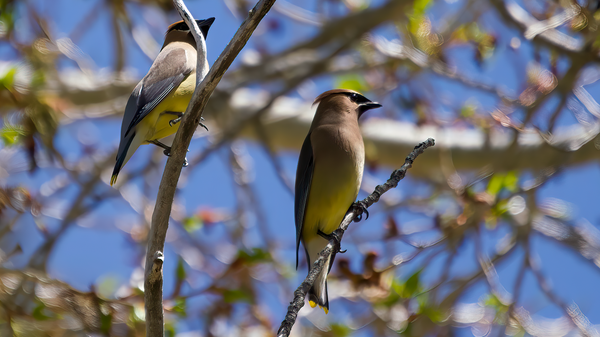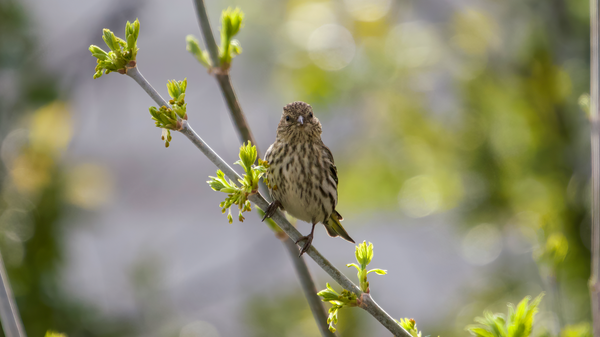Sustainable Bird Feeders Offer Solutions to Attracting Birds and Minimizing Plastic Waste

Birds, like this American Robin, are helped when plastic is reused.
While birds may find sticks and leaves to craft their nests, here at Birds Choice, we use an unlikely source to create our products: the plastic contents of your recycling bins. We should not have to sacrifice nature to feel closer to it, and our sustainable birding solutions give you the ability to do both.
A birdy solution to plastic pollution
It’s a fact: sustainable products are desired by more than just bird lovers. A study by Nielsen found that 66% of global consumers are willing to pay more for sustainable goods. In other words, sustainable living is not only possible – it is a growing passion in our communities. As the sustainable birding movement gains popularity, we are proud to continue our dedication to creating safe, quality products for birds and the environment.
Working with strategic and sustainable partners since 2019, we have kept almost 2 million pounds of plastic out of landfills, transforming them instead into Birds Choice homes and feeders. With the current global use of plastic at well over 350,000,000 tons annually, Birds Choice is making every effort to encourage recycling plastics in proper form to help our bird friends.
So, how does sustainable living help the environment? Let’s take a closer look at one of our sustainable solutions: bird feeders made from waste plastic.
Waste plastic bird feeder > wood bird feeder in disease prevention
When you purchase a Birds Choice feeder made from recycled plastic, you are helping to reduce the amount of plastic waste in landfills. Additionally, recycled plastic bird feeders are safer for birds by reducing disease exposure. Plastics are a less porous material, making them easier to sanitize. Studies focusing on wooden vs. plastic cutting boards have shown that plastic is more easily sanitized than wood after contamination with Salmonella bacteria.
Minimizing the spread of disease is important for wild birds, and recycled plastics can help in the fight against feeder-borne diseases.
Recycled plastic bird feeders have a longer lifespan than wood bird feeders
Plastic waste is a more durable option than wood. Plastic bird feeders last up to five times longer than their wooden counterparts. This increased lifespan not only reduces waste but also cuts down on the manufacturing process and energy required to produce new feeders. In a study out of Ohio, recycled plastic displayed less drastic changes under standard environmental conditions than typical lumber. According to a U.S. Army Corps of Engineers study, composite and plastic waste products are durable, stable, resilient, and resistant to weather, rot, mildew, and termites. Additionally, plastic lumber products do not require regular repainting or re-staining.
The longevity of these eco-friendly bird feeders helps reduce plastic pollution, and these are a less energy-intensive option for bird lovers.
Recycled plastic lumber has a lesser environmental impact than wood
When choosing sustainable birding products, it is important to consider the entire life cycle of a product – from the sourcing of materials to the end of its usefulness. Recycled plastic lumber has been found to have a smaller carbon footprint than wood. In one study, recycled HDPE plastic was found to have 12 times less impact on global warming than an equivalent amount of lumber from virgin trees. The production of recycled plastic lumber also requires less energy than the creation of new wood products, further reducing CO2 emissions.
Recycling plastic waste helps reduce the impacts of the plastics industry while also minimizing the removal of lumber from the environment.

Help birds: hang feeders from waste plastics
If you have not read our ten easy steps for helping birds, you may not know that hanging a bird feeder is a great way to help your local and migratory birds. Bird feeders that do not require new plastic production or lumber removal are safer to use while lasting longer and support these ten bird-friendly steps even more. Removing plastic waste from the landscape and landfills is critical for all birds and other wildlife. Recent studies have shown that over 60% of seabirds have ingested plastic waste. With over 5 trillion pieces of plastic in the ocean, according to the Ocean Cleanup project, we need more bird-friendly and economically viable solutions to lessen our plastic products problem. Recycling these waste plastics and converting them into bird feeders can only help birds while minimizing our environmental impacts.
You can take many more steps to have a bird-friendly home, but hanging bird feeders made through plastic recycling is a great first step.
Use a sustainable bird feeder
Using longer-lasting products, reducing waste plastic, and encouraging plastic recycling are all critical to creating a better world for humans and birds. Consider switching to a Birds Choice sustainable bird feeder today. Your support allows us to continue our removal of plastic waste from our landscape.
Birds Choice is proud to offer sustainable bird-feeding solutions that are safe for birds and the environment. Our feeders are made from plastics that help reduce plastic waste, minimize the spread of disease, and encourage the proper recycling of plastics.
Bird feeders to help human-kind
A study published in March 2022 revealed some of the impacts of plastics on humans. Of the human participants in the study, over 77% contained plastics in their blood. How can this impact us? While studies are ongoing, researchers have seen evidence of cellular damage due to microplastics. While recycling cannot solve this problem alone, removing more plastics from our airways, waterways, and landscapes begins to move our world in a healthier direction.
Extracting free-moving plastics is not the only way our bird feeders help communities. According to research by academics at the University of Exeter, the British Trust for Ornithology, and the University of Queensland, people living in neighborhoods with more birds, shrubs, and trees are less likely to suffer from depression, anxiety, and stress.
Creating a backyard sanctuary for birds benefits you, your family, your neighbors, and of course, our feathered friends.

Your choice, Birds Choice
Bird feeding is not just about feeding birds; it is about fueling connections. Bird feeding is about nurturing one’s love for nature and giving passion a place to perch. And that is exactly what Birds Choice does: We bring our customers closer to the world outside by bringing the outside world closer to them, transforming backyards into living sanctuaries. We provide the opportunity to connect and engage with the natural world, but on your terms.
If you are looking for a new bird feeder to help the environment and look good in your yard, consider purchasing a Birds Choice feeder. Made of recycled plastic materials, these beautiful feeders are good for birds and help reduce the amount of waste going into landfills or landscapes. With so many options to choose from, we have a guide [Insert link: future article] to help you understand which feeders will best serve you and your backyard birds!
While sustainable bird feeders are not the sole solution to our plastic problems, they are a step in the right direction. As we look for ways to reduce our reliance on single-use plastics, sustainable bird feeders offer a way to help birds and humans alike. What other sustainable swaps can you make in your life?
Hang a Birds Choice feeder today and start enjoying the sight of beautiful birds up close!
Have questions about our eco-friendly bird feeders? Please contact us here!




